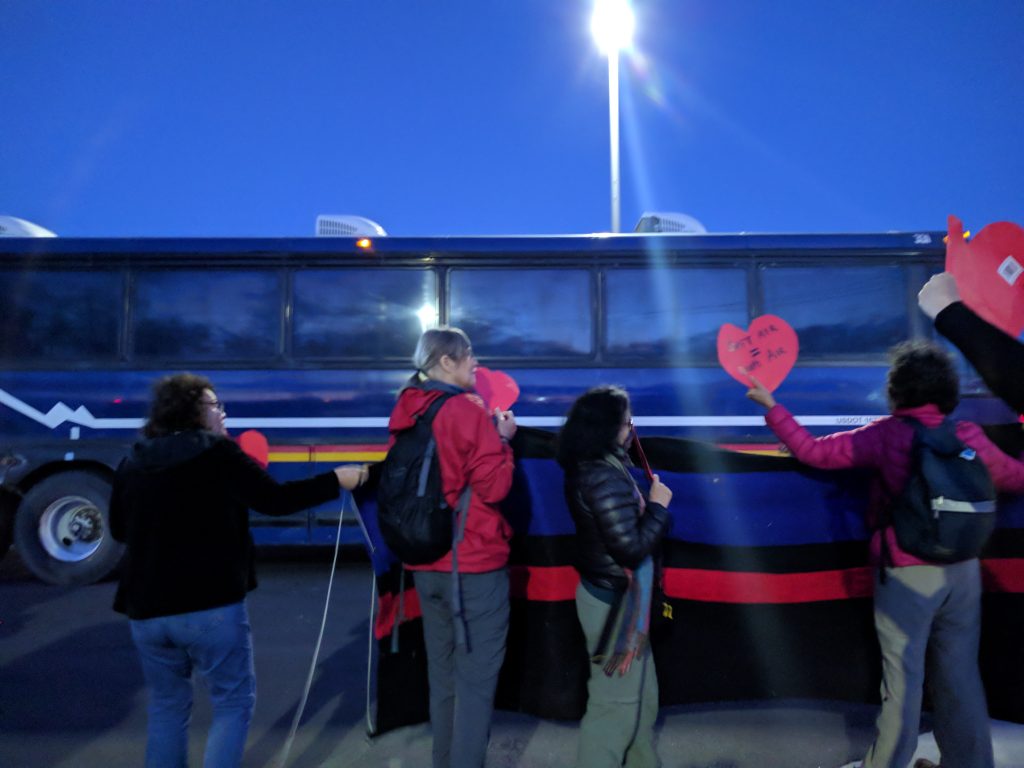They come in shackles. They hold their shackled wrists up to the bus window and blow kisses. We hold hearts and shout, “Lo queremos” (We love you) and “No estan solos” (You are not alone).But are they alone? Even the one who manages to open the slot at the back of the bus and poke out his mouth, which must involve a contortion of the neck—difficult to do with shackled limbs. Isn’t he still alone as he tells us, “Muchas gracias,” the whispered voice evaporating into the shouts of the crowd. Through the window all you can see are his teeth.
Through the teeth of the fence, a plane’s engine rumbles. The people on the buses are about to be loaded into the belly of the plane, swallowed like Jonah and the whale, then spit out into a country where men have threatened to kill them, or worse, kill their children. But right now, everything has stopped. The parking lot’s filled with hearts held and hearts dropped in the cold, like blood on the concrete. It’s a small moment. Then the bus engines rumble again. A swarm of police in dark clothing tell us to clear the way. There’s another stop-moment as we stand by the place where the gate has opened, staring back into the early dawn bus headlights like dazed deer. My husband takes my arm. “I’m not ready to stand in front of a bus,” he says, and the crowd begins to part like the Red Sea. The bus inches toward the belly of the plane, and I keep thinking, what if this were a train headed for Auschwitz? Would anyone have been there holding signs along the tracks? Would anyone have stood in front of the tracks? And would it have mattered? Would those certain deaths, the Nazis quickly and likely shooting them, have made a difference? Would they have made our ancestors’ trips to the gas chambers any easier?
The man who talks to the press, Josh Rubin, who spent hundreds of days witnessing children in cages in Tornillo, Texas and Homestead, Florida says these are extermination flights. The plane’s belly rumbles. The buses head through the gate and park behind a building where we can’t see them through the fence that separates us from the runway. There’s a truck parked in front of the plane, so we won’t be able to see the shackled people as they shuffle up the stairs with shackled legs.
A chill has settled over Texas and we shiver, consider going back to the comfort of our warm cars, our rented rooms. Across the river in Mexico, thousands of migrants with bright faces are huddling over their small cook stoves, or shivering in their donated sleeping bags, or looking across the muddy strip of the Rio Grande at the metal fence, and beyond it a sign that says, “Welcome to the United States of America.” Only a few will cross, but why not keep hoping? It’s like playing the lottery. Why not believe for a second, or a moment, or a lifetime that your story will be the one that softens the judge’s ears? Just yesterday, we saw someone walk free. That rare million-dollar moment. When I asked him what happened, he said, they killed my whole family in Honduras.
A little boy with a torn shirt stands by the steep embankment overlooking the river. A toddler with thick hair and almond-shaped eyes holds her tiny hands over the sanitizer on the dinner line and slowly rubs the cool gel between her fingers as if it’s gold. In the writing workshop that we have offered to twenty families along with bolsitas of rice and beans, a woman asked to write the story of her heart tells me she doesn’t know how to write. Without words, all she has to offer are tears. My compañera, who speaks better Spanish, offers to write for her so she can have a story to hold under her pillow or close to her chest. But what will happen if she, too, ends up in the belly of the plane? Will her words go with her? Will they matter?
(Published in the Daily Hampshire Gazette: https://www.gazettenet.com/Friedman-letter-33050187)
